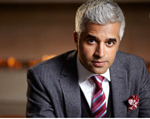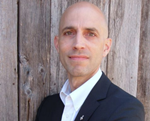
RIAZ Meghji
| Plenary 1
Every Conversation Counts
To be successful, we need to build meaningful relationships. To build meaningful relationships, we need to have meaningful conversations.
In this funny and heartfelt talk, Meghji documents the memorable conversations that some of the world’s most fascinating figures have engaged in to achieve success and—more importantly—realize their true sense of purpose. Through intimate interviews, he uncovers what makes for great, life-changing social intercourse. And, he explains how simple conversation rules—learn something new; let someone know they matter; introduce an idea—can change everything. Meghji takes a candid and far-ranging look at how creative conversations have the potential to reinvent your business, reenergize your brand, and further develop your career. Success is achieved one conversation at a time, he reminds us. A conversation can change everything or nothing. It’s up to you. Riaz Meghji is the Host of Breakfast Television Vancouver, covering topics in current affairs, arts and pop culture, philanthropy, entertainment, sports, and business. Before transitioning to television, Meghji worked in radio; and before joining co-host Jody Vance on BT, he was a host with MTV Canada, CTV News, Bell Media, and the Toronto International Film Festival. He has spoken at TEDxSFU and hosted TEDxVancouver.
Meghji is the co-founder of nonprofit 1Karma, which has supported Covenant House, Aga Khan Foundation, and the Canadian Cancer Society by fundraising and raising awareness. He is also the originator of Every Conversation Counts: a website that shares insights from leaders, celebrities, athletes and philanthropists all with one common thread—memorable conversations about success, purpose, and life-altering moments. Raised in Delta, British Columbia, Meghji attended Simon Fraser University and received a degree in Finance.
|

STEPHANE Grenier | Plenary 2 The Power of Human Interaction
Stephane Grenier has challenged society’s traditional outlook regarding mental health for much of his career by redefining how we should care for and support those affected by mental health problems. His body of work began in his very own workplace, the Canadian Military, where he created and managed numerous employee driven mental health programs that have proven effective over the years and have been sustained since his departure. His body of work includes coining and defining the term “Operational Stress Injury” in 2001, a term later adapted by the US Marine corps as “Combat Stress Injury”. His views have resonated as far as with the American Psychiatric Association when debating the value of renaming the diagnostic of “Post Traumatic Stress Disorder” to “Post Traumatic Stress Injury”. In 2012, he retired from the military and created Mental Health Innovations consulting (MHI) in order to dedicate his full attention to developing non-clinical mental health interventions as a complement to traditional clinical care and also co-founded Peer Support Accreditation and Certification (Canada), a non- profit organization dedicated to the advancement of peer support. In 2015, he was awarded an honorary degree of Doctor of Laws honoris causa by the University of Guelph. |